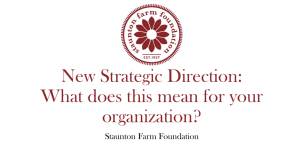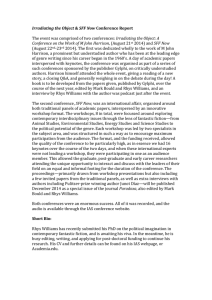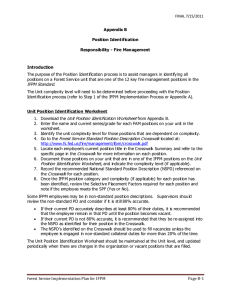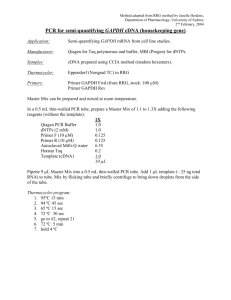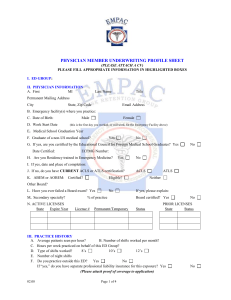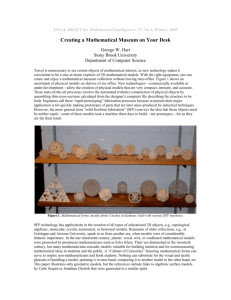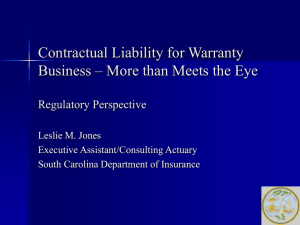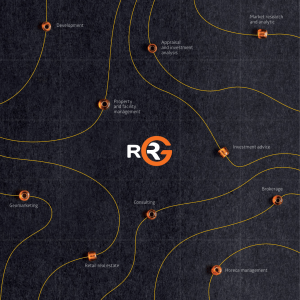Download the guidelines and application packet
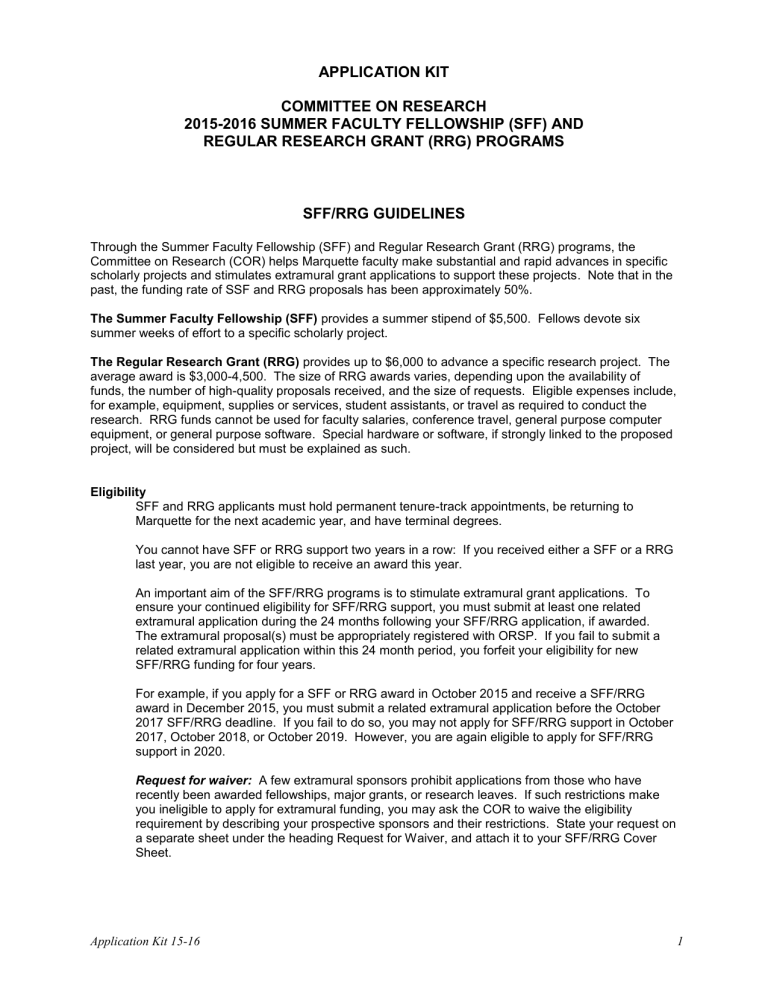
APPLICATION KIT
COMMITTEE ON RESEARCH
2015-2016 SUMMER FACULTY FELLOWSHIP (SFF) AND
REGULAR RESEARCH GRANT (RRG) PROGRAMS
SFF/RRG GUIDELINES
Through the Summer Faculty Fellowship (SFF) and Regular Research Grant (RRG) programs, the
Committee on Research (COR) helps Marquette faculty make substantial and rapid advances in specific scholarly projects and stimulates extramural grant applications to support these projects. Note that in the past, the funding rate of SSF and RRG proposals has been approximately 50%.
The Summer Faculty Fellowship (SFF) provides a summer stipend of $5,500. Fellows devote six summer weeks of effort to a specific scholarly project.
The Regular Research Grant (RRG) provides up to $6,000 to advance a specific research project. The average award is $3,000-4,500. The size of RRG awards varies, depending upon the availability of funds, the number of high-quality proposals received, and the size of requests. Eligible expenses include, for example, equipment, supplies or services, student assistants, or travel as required to conduct the research. RRG funds cannot be used for faculty salaries, conference travel, general purpose computer equipment, or general purpose software. Special hardware or software, if strongly linked to the proposed project, will be considered but must be explained as such.
Eligibility
SFF and RRG applicants must hold permanent tenure-track appointments, be returning to
Marquette for the next academic year, and have terminal degrees.
You cannot have SFF or RRG support two years in a row: If you received either a SFF or a RRG last year, you are not eligible to receive an award this year.
An important aim of the SFF/RRG programs is to stimulate extramural grant applications. To ensure your continued eligibility for SFF/RRG support, you must submit at least one related extramural application during the 24 months following your SFF/RRG application, if awarded.
The extramural proposal(s) must be appropriately registered with ORSP. If you fail to submit a related extramural application within this 24 month period, you forfeit your eligibility for new
SFF/RRG funding for four years.
For example, if you apply for a SFF or RRG award in October 2015 and receive a SFF/RRG award in December 2015, you must submit a related extramural application before the October
2017 SFF/RRG deadline. If you fail to do so, you may not apply for SFF/RRG support in October
2017, October 2018, or October 2019. However, you are again eligible to apply for SFF/RRG support in 2020.
Request for waiver: A few extramural sponsors prohibit applications from those who have recently been awarded fellowships, major grants, or research leaves. If such restrictions make you ineligible to apply for extramural funding, you may ask the COR to waive the eligibility requirement by describing your prospective sponsors and their restrictions. State your request on a separate sheet under the heading Request for Waiver, and attach it to your SFF/RRG Cover
Sheet.
Application Kit 15-16 1
Additional Considerations
All applicants may apply for either the SFF or the RRG, or both. Applicants applying for both awards may receive one, none, or both, depending on the merit of the application.
Supervising a research assistant is not, by itself, an eligible activity for a Summer Faculty
Fellowship. If you apply for a RRG to fund a research assistant and also a SFF to work alongside the research assistant, your SFF/RRG proposal must clearly distinguish the work to be done by the research assistant and the work you will do as a Summer Faculty Fellow.
Two faculty may collaborate on a single SFF and/or RRG application. Both must be eligible applicants. The budget may include a SFF of $5,500 for each collaborator and/or a RRG of up to
$10,000.
Candidates without substantial extramural funding will be given preference.
Summer Faculty Fellowship awardees who accept other funding for their summer salary must negotiate with, and seek prior approval from, the Vice President for Research and Innovation or return the SFF award.
Individuals who receive SFF and/or RRG awards for projects that involve human subjects, animals, or bio-hazardous materials must provide letters of protocol approval from the University
IRB, IACUC, or IBC before the award funding will be distributed.
Review Process
The Committee on Research is multidisciplinary, composed of scholars from across the
University. Your proposal must be written so that all members of the committee can readily understand it. Avoid using technical jargon. A nontechnical description of the project is critical to communicating your ideas.
The Vice President for Research and Innovation establishes three groups representing 1) a natural/physical/applied sciences panel, 2) a humanities panel, and, 3) a social sciences panel.
Each applicant must designate the panel to which his or her proposal should be submitted.
Representatives from various disciplines within these areas will review applications so be sure to write for a broad audience.
Proposal packets are distributed to the panel designated by the applicant. With the proposal packet for each proposal there will be a list of Primary Reviewer, Secondary Reviewer, Tertiary
Reader, and two Additional Reviewers. The Primary Reviewer will have the responsibility of presenting the proposal to the entire panel. The Secondary Reviewer will have time to further reflect on the proposal and add any additional information. The Tertiary Reader will have the opportunity to make additional comments. The Additional Reviewers will not present but will participate in a discussion of the proposals after formal presentations are completed. All panel members will read and rate those proposals assigned to their group.
See Review Considerations for a table identifying the primary review criteria and their respective values.
Questions about the Application Process
Direct your application questions to the Vice President for Research and Innovation or the Office of Research and Sponsored Programs.
Application Kit 15-16 2
INSTRUCTIONS FOR PREPARING YOUR SFF/RRG APPLICATION
Submission Instructions and Deadline: Please complete the application by typing in the required information on the form. Print out a copy and obtain the required signatures. Scan the signed application and send the document electronically to: melody.baker@marquette.edu
(Office of Research and Innovation) no later than
4:00 p.m. on Thursday, September 24, 2015 .
A complete SFF/RRG application consists of the following items in the order listed below.
1) SFF/RRG Cover Sheet (First page of the application). If you are requesting an eligibility waiver, include your request following the cover sheet.
2) Abstract.
On a separate page provide an abstract of no more than 250 words that presents an overview of your proposal for a nonspecialist audience and suitable for general publication. State clearly what will be done and why this work is important. Abstracts submitted that exceed the maximum word count will result in the entire application being deemed ineligible for consideration.
3) Project Description.
The Project Description must be no more than four single-spaced pages using 12 point font and 1" margins. The project description must be written in such a way that scholars outside of your discipline can readily understand it. Avoid jargon. Project descriptions that do not adhere to these specifications will result in the entire application being deemed ineligible for consideration.
In the context of a RRG or SFF proposal, the word “project” means the work to be performed and the objectives to be accomplished during the period of support.
Use these headings in order: a) Significance and Broader Impact
Provide a short literature review and a clear and concise explanation of the project and its value to scholars in the natural, physical and applied sciences, humanities, or social sciences, as appropriate. Discuss why this project is significant. State how knowledge or practice in your area will be advanced if the project objectives are achieved. Representatives from various disciplines within these areas will review applications so be sure to write for a broad audience. b) Specific Research Objectives
State and elaborate on the specific aims of the proposed work (for example, to test a stated hypothesis, challenge an existing paradigm or describe what you plan to accomplish through this project). Describe how this project differs from, or extends, currently funded work. c) Work Plan
Explain the methods you will employ in this project. Describe how the central research question(s) will be approached and how potential difficulties will be resolved. Describe the tasks to be undertaken with a prospective timeline. d) Relationship to Research Goals
Briefly describe how the proposed work relates to your immediate and long-term research goals. Explain the impact this project will have on your research trajectory and research career development, being as specific as possible. Provide an account of any preliminary studies you have conducted pertinent to this application.
4) Bibliography
Provide a bibliography of any references cited in the Project Description. This section is not included in the four page limit.
5) SFF/RRG Project Budget (use the form provided).
Application Kit 15-16 3
6) Budget Justification. Every component of the budget request for the RRG must be explained fully.
7) Results of Prior SFF/RRG Awards (if applicable). If you have received prior SFF/RRG funding, summarize the results of the award(s) in no more than one single-spaced page . The committee will pay particularly close attention to this section in their review. a) What did your past SFF/RRG awards enable you to accomplish? b) With reference to your curriculum vita, what submissions, presentations, or publications have resulted from work undertaken with past SFF/RRG support? c) What proposals for extramural funding have you submitted to support work related to the projects described in your prior SFF/RRG award(s)? To which sponsors did you apply, and when? What were the outcomes?
8) Curriculum Vitae ( 2 to 5 pages ). Your vita is a critical part of your application; it should highlight your professional growth, publications, presentations, patents, grants, and other items relevant to the proposed project.
For publications, provide inclusive page numbers.
For each article under review, name the journal and, if applicable, co-authors.
Make an "X" in the left margin to call attention to each publication, patent, prior grant, conference presentation, or other item immediately relevant to the proposed project.
Application Kit 15-16 4
REVIEW CONSIDERATIONS
Application
Component
Abstract
(250 words max)
Project
Description
(4 pages max.)
References
Vita
(2-5 pages)
Criteria
Provides a clear, concise description of the proposed work and its significance that a non-specialist would readily understand. Abstracts of successful proposals will be publically posted.
Significance and Broader Impact
Motivates the proposed work. Addresses and advances the leading questions shaping the applicant’s discipline.
Importance/significance of the proposed work is established and comprehensible to a non-specialist reader. Relates the proposed work to larger concerns (e.g., society, economy, culture, health, environment, technology).
Provides a clear review of prior work in this area and its associated limitations. Persuades the general reader that the issues addressed reflect significant scholarly concerns and/or address important and timely developments in this area.
Specific Research Objective(s)
Specific aims of the proposed work are clearly stated.
Proposed work constitutes a significant achievement or represents a meaningful advance to the field.
Probability of attaining specific aims is high; aims are reasonable and attainable during the grant period with the funds requested.
Work Plan (including Budget w/ Justification)
Research methods (experimental, interpretive, descriptive, analytical, or other) are clearly articulated and sufficiently detailed that an informed, non-specialist reader can understand how the applicant will actually conduct the proposed work.
Proposed methods are reasonable, appropriate, and likely to yield the research specific aims.
Research effort is decomposed into specific tasks (each with a realistic milestone) which, upon completion, will likely ultimately yield the research objective(s).
Requested resources are appropriate and clearly facilitate accomplishing planned tasks and achieving research objectives.
Relationship to Research Goals
Proposed work strongly relates to and advances the applicant ’s research goals.
Describes why an award of this type at this time constitutes an effective and strategic allocation of resources for the applicant ’s research trajectory and research career development.
Provides evidence of understanding the current state of the a pplicant’s field and of the applicant’s past contributions to the discipline.
Provides evidence that the applicant is capable of performing high quality work in the proposed research area.
Maximum
Points
10
25
25
25
15
0
0
Total
Application Kit 15-16
100
5
APPLICATION CHECKLIST
[ ] SFF/RRG Cover Sheet
[ ] Request for Waiver (if applicable, see Eligibility)
[ ] Abstract
[ ] Project Description
[ ] Bibliography
[ ] SFF/RRG Project Budget
[ ] Budget Justification
[ ] Results of Prior SFF or RRG Awards (if applicable)
[ ] Curriculum Vitae
Application Kit 15-16 6
SFF/RRG COVER SHEET
(This should be the top page)
(Please type)
Application Receipt Deadline: 4:00 p.m. Thursday, September 24, 2015
Type of application: SFF RRG Both
Review Panel: natural, physical and applied sciences humanities social sciences
Collaborative Application: No Yes
Descriptive Project Title (Limited to 120 character, including spaces)
Name:
Department:
Phone: Email:
Academic Rank: Assistant Professor
Associate Professor
Full Professor
MU Hire Date:
This project involves (check all that apply):
Human Subjects Vertebrate animals Recombinant DNA Radioactive Materials
Does this SFF/RRG application request graduate student support? Yes No
What other internal and external research support are you currently receiving (e.g., external grants, start-up funding, etc.)? Please provide a list of any pending applications and current awards.
If awarded, describe your plans for submitting an external grant application.
Applicant signature and date
Chair/Unit Administrator signature and date
Application Kit 15-16 7
Please complete the following if this is a collaborative proposal
Collaborator Name:
Department:
Phone: Email:
Academic Rank: Assistant Professor
Associate Professor
Full Professor
MU Hire Date:
Have you searched for external funding? Yes No
If yes, explain how you searched for external funding (even if your efforts were not successful)
What other support are you currently receiving?
Applicant signature and date
Chair/Unit Administrator signature and date
Application Kit 15-16 8
SFF/RRG PROJECT BUDGET
Name(s):
Department(s):
Project Title:
SFF/RRG BUDGET TABLE
Double click on the table, and then add your budget figures:
Type of
Application
(Y/N)
Item
SFF ($0, $5500, $11000 (joint app))
Funds Requested from the
Committee on Research
$0.00
RRG
Please itemize RRG amount below
Personnel
Graduate Research Assistant(s)
Undergraduate Research Assistant(s)
Other Personnel, please list.
Funds Requested from Other Sources
Source of
Other Funds
Equipment
Supplies
Travel
Consultants/Professional Services, please list.
Other, please list.
TOTAL RRG REQUEST, if applicable $0.00
$0.00
TOTAL COR REQUEST (SFF + RRG): $0.00
RRG PROJECT BUDGET JUSTIFICATION
On a separate sheet under the heading “RRG Project Budget Justification,” describe each item you listed in the RRG portion of the budget table . The description should enable reviewers to understand a) how the cost of each item was computed, and b) how the budget items relate to your project objectives.
NOTE: Awardees will be notified before winter break. RRG funds may be spent in an 11-month period.
Awardees must provide spending plans for two fiscal periods:
1)-Start Date of February 1 – 6/30 (current fiscal year), and 2) 7/1 – 12/31 (next fiscal year). RRG funds are bound by fiscal year budgeting restraints. Awardees will be required to provide carefully crafted and accurate spending plans for these two periods. Funds budgeted in any fiscal period must be spent in that fiscal year or they will no longer be available. Awardees will work with ORSP staff to administer their awards.
Application Kit 15-16 9
